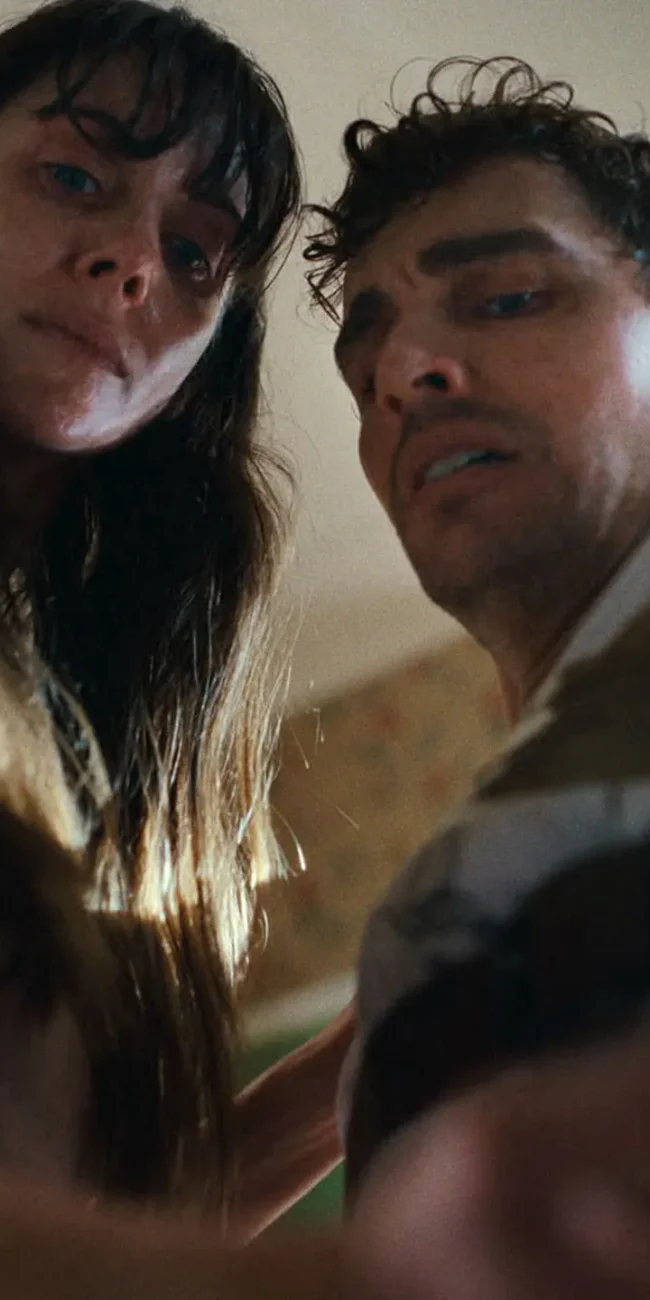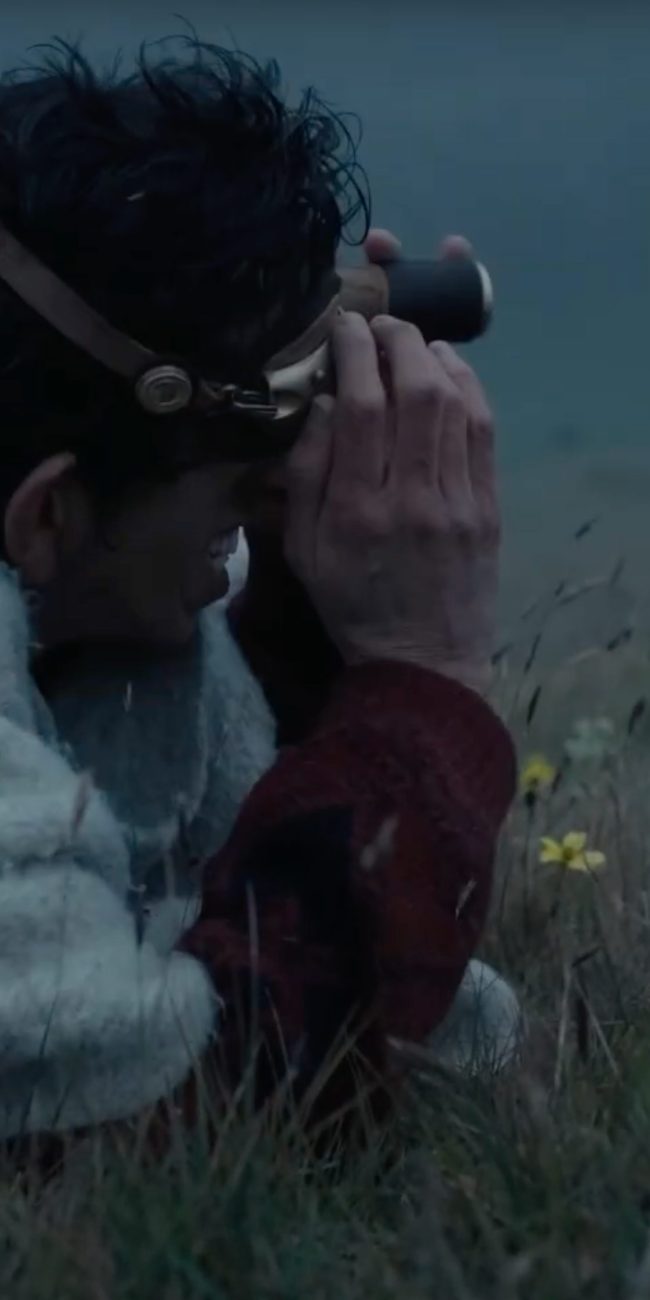A Conversation with Marja-Lewis Ryan and Producers Samantha Housman and Ross Dinerstein (6 BALLOONS)
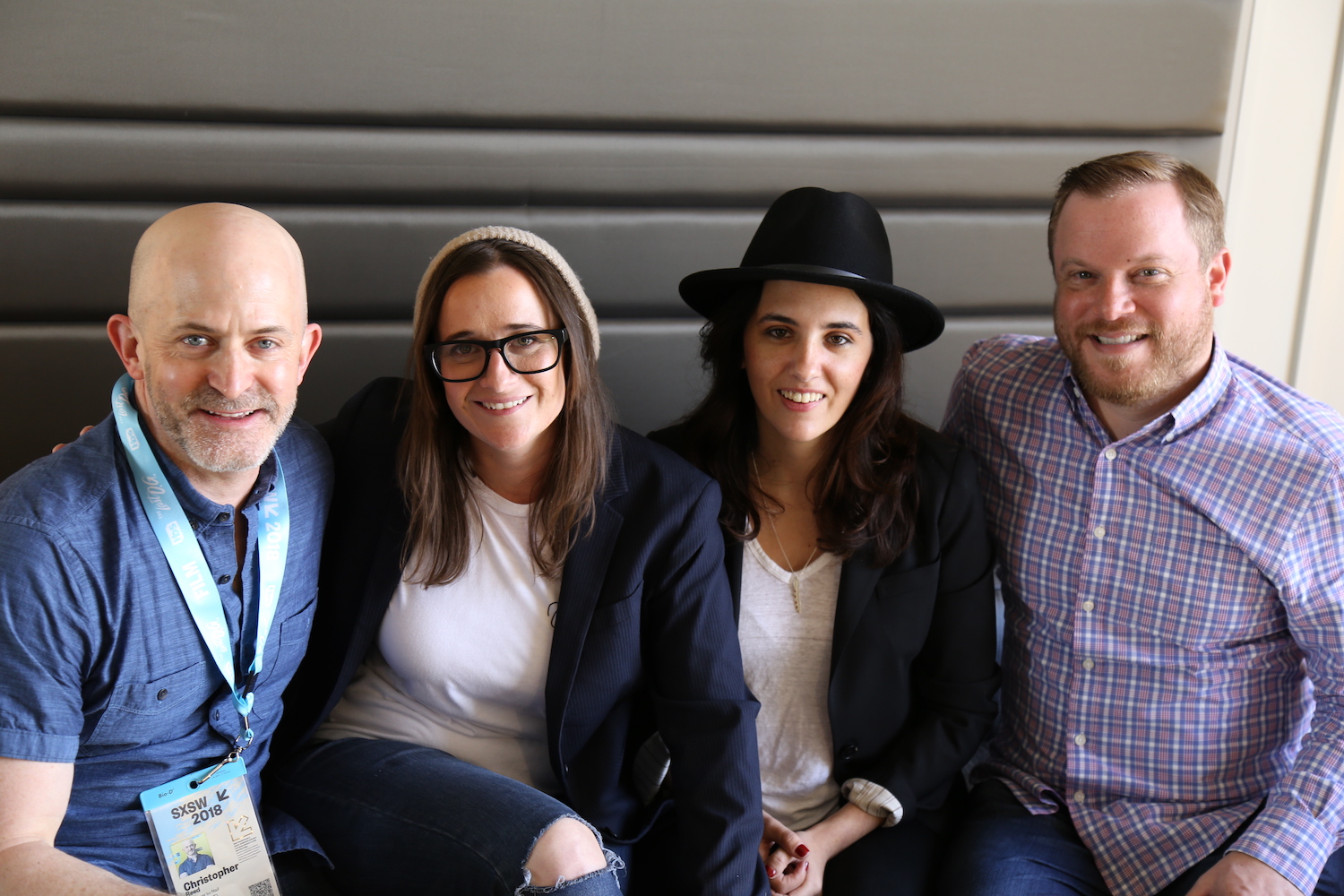
I met with first-time feature director (and playwright) Marja-Lewis Ryan and producers Samantha Housman and Ross Dinerstein, of the new Netflix feature 6 Balloons (which I also reviewed, and which comes out online on April 6), on Monday, March 12, at the 2018 SXSW Film Festival. The movie tells the harrowing tale of two siblings caught up in the brother’s heroin-addiction woes. Abbi Jacobson plays the responsible sister, compelled by a long history of codependency to help brother Dave Franco get the fix he needs, all while his infant daughter rides in the car with them. Brilliantly shot and edited, the film is a marvel of cinematic efficiency and evocative artistry, with all involved turning in excellent work. Here is a condensed digest of our conversation, edited for clarity.
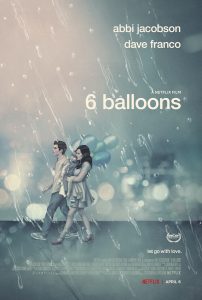 Hammer to Nail: So, Samantha, I read, in the press notes, that the script for this film is based on events in your own life. Could we start, then, with the origins of the story?
Hammer to Nail: So, Samantha, I read, in the press notes, that the script for this film is based on events in your own life. Could we start, then, with the origins of the story?
Samantha Housman: Marja came to me. I wasn’t like, “Oh, hey, this thing happened to me, let’s make a movie about it.” (laughs) It was more like (speaks quietly), “This thing happened to me and it was the worst thing in the world.” But really, it’s all Marja.
Marja-Lewis Ryan: And then, several years later, I said, “Remember that night? I would like to write it.”…We were friends…
SH: We’re friends. We’ve been very good friends for like 12 years.
HtN: So, that was then going to be my question: how do you two know each other, how did you…
M-LR: We’re lesbians. We met at a bar. (laughs)
SH: We met at the…
M-LR: Never together.
Ross Dinerstein: They’re not lesbians with each other.
M-LR: No, no, no, no, no!
RD: They’re both married to other women.
M-LR: Yeah, yeah!
SH: We met at The Abbey, and Marja had on a Tiffany’s necklace, and I…
M-LR:…saw me from across the room.
SH: Literally saw her from across the room, in her Tiffany’s necklace, and I thought, “Perfect: an east-coast Jewish lesbian that I can be best friends with.” And then I was wrong…
M-LR: She was, like, two-thirds right.
SH: Still best friends.

Marja-Lewis Ryan, Samantha Housman and Ross Dinerstein, of the new Netflix feature 6 Balloons
HtN: So, how did this story then develop. You’d heard this, Marja, now what made you want to start writing it?
M-LR: Well, the story had stuck with me, because Amy is one of my dearest friends in the whole world, and it was an incredibly painful time in her life, as I’m sure you could imagine. And then, as the opioid epidemic grew, that story stayed with me, because I wasn’t hearing that story. And I was like, “That doesn’t make any sense,” because this story must be happening. There were all those photos coming out of addicts in the front seat of a car, passing out, with their baby in the back. It was so brutal to see that.
But then we were also missing half of the story, which is the enabler’s story, the story of learning to let go with love. That felt like something I hadn’t really seen before. Except maybe in…what’s that Meg Ryan movie? When a Man Loves a Woman! That’s the only time, because it’s really his story, there.
SH: (whispers) My God…yeah!
RD: Tough movie to watch.
M-LR: Tough movie to watch.
SH: Tough movie to watch!
M-LR: But that’s why, I think. It’s hard to relate to a heroin addict. It’s hard for me to understand. But in our film, she’s just like me, and I’m like, “Oh, you’re just like me.” So that, I could start to understand.
HtN: If a movie handles addiction properly, I think it’s almost always hard to watch.
RD: Right. There’s no happy end.
HtN: If they’re fun to watch, then it’s probably not a good movie about addiction. Although I could be wrong! I’d love to see this amazing rom-com that also gets addiction right. (laughs) I lay down the challenge!
SH: All right! It’s on the table for Marja!
M-LR: Rejected. Hard pass!
HtN: OK, then! So, Mr. Dinerstein, what is your involvement in all this? I understand now why Marja and Sam work together. What about you?
RD: Sam and I work together, and she brought the script to me, and I remember where I was when I read it. I had an emotional response to it. It is definitely different than a lot of the films I have made, but I felt like it was a very important film, and I promised both of them that I would figure out how to get it made. Luckily, the first place we took it to wanted to make it, and I have a long-standing relationship with Netflix, and this seemed to fit really well. They really responded to the script. Marja, Sam and I had a great meeting with them, and we were rocking and rolling. It shouldn’t be that easy! It never is that easy. But that speaks for the material and for Marja.
HtN: Cool! So, let’s talk about the casting. How did you choose Abbi Jacobson, Dave Franco, etc?
M-LR: So, I had always thought of Abbi, even when I was writing it. I love watching comedians making dramatic turns. There was always something about her. She plays like a straight man on Broad City, so you can actually see her clearly, even through the absurdist moments. She always just felt like us. If she were sitting here, there’s something that we all sort of share, like a collective voice.
And I do write funny people in dark circumstances, and she really understood that. She could really pick up on the comedy, and like lean in to it, almost. And that makes a huge difference, because it is brutal to watch. It also gave Abbi and Dave this shared sense of history. It’s hard to pretend that you’ve known each other all your life, when you just met two weeks before you started shooting, but they sound similar, ‘cos they’re funny. They make each other laugh, in a real way.
HtN: I definitely believe their rapport. Now, how do you convince parents to let you cast their young twins to play Dave Franco’s child in a film about heroin addiction?
M-LR: I imagine that it was going to be really hard, but the right person happened to walk into the room, and I couldn’t really believe it, because every other twin that came in to audition for me was behind their parents. And I love working with kids, and can usually get them to do something, but these particular kids came walking into the room, and saw that I had X’s on the floor, and so we played the X game: “You’re going to go to that X, and then that X, and you’re going to wave to this person.” You know, to see what they can do, and if they can do it a bunch of times, over and over: “Can you do it 12 times in a row?” And these kids were like, they walked in and stood on the X’s, and then they started switching places, and they thought it was a really fun thing, and then their parents were just like…
SH:…incredible.
M-LR: They’re our age, they understand…
SH: A dream come true.
M-LR:…why the story is so important, and they also really trusted us. Those kids never saw anything. Like, that bathroom scene seems really scary.
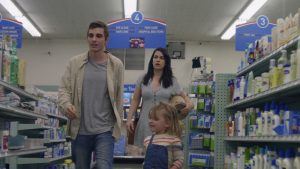
HtN: It does!
M-LR: But while we’re watching it form this really gorgeous overhead shot, that little girl is sitting there with Abbi, and she’s like (speaking in baby voice), “What Dave doing in there? I’m hungry!” And she’s just living her life, you know what I mean? And then Dave comes out and wants to play, and she’s like, “Oh!” And that’s all real. But when we’re watching it, it looks horribly sad, because we just saw what happened in there, so I think that those kids and the parents were fine.
RD: I’ve made a lot of movies with kid actors, and the parents are as important as anything.
HtN: Of course!
RD: But also, it goes to Sam and Marja just being able to work with young kids and having the tolerance to do. There’s not a lot of margin for error in indie filmmaking, and so working with kids is kind of frowned upon, because it’s so hard to make your day. And here, their performances are amazing, which just shows how good of a job they did, along with their patience and stomach to handle it.
M-LR: And they were 3 years old. And they’re much smarter than we give them credit for. I did get to sit them down and say, “I’m telling a story, and this is pretend. Will you tell this story with me? I need your help.” And they really responded to “I need your help.” They go (baby voice), “Oh, I can help. I help!” And by the end, they were like (baby voice), “Where’s my twailer?”
SH: (baby voice) “I want a juice box in my twailer!”
RD: As parents – Sam and I are both parents of young children – those kids are special. All due respect to our kids, they couldn’t have done that for one minute.
SH: No way.
RD: They’re special kids.
HtN: They’re really natural on camera.
SH: They were amazing.
M-LR: And it’s funny, because about halfway through, I went, “I know why I like these kids so much,” and I pulled up a picture of myself as a baby, and showed their mom…
SH: And you looked exactly alike.
M-LR: It’s my own ego! Sock it to me! We’re on the same page, me and those twins.
HtN: So not only did Abbi remind her of you, but so did the kids.
SH: Anybody who works with Marja, basically looks like her.
HtN: Dave Franco…
SH:…looks like Marja’s brother, yeah.
M-LR: (quietly) Well…not quite…
HtN: Speaking of the casting, I really liked the woman who played the pharmacist. I thought she was great.
(everybody laughs, Marja the loudest)
SH: Did you really? Did someone tell you to say that?
HtN: No! I liked her! Why?
M-LR: Shut up!
HtN: Why?
SH: She’s like our…
M-LR/SH: (together)…best friend.
HtN: She was great!
M-LR: She’s the lead actress in all my plays.
HtN: I didn’t know that.
M-LR: And she is phenomenal. I gave her the script, and I was like, “What part do you want to play?” And she went “Oh, I’m definitely doing that pharmacist!” And I was like, “Really? You don’t want to play…” There were, like, bigger parts, in the intake places. And she was like: “I’ve done this long enough to know what scene is not going to get cut. And the fact that Abbi has a key in this scene, and then in that one and in this one, means I’m not going anywhere.”
HtN: (laughs loudly)
SH: But then we did a table-read, and Heidi read…
M-LR: Her name is Heidi Sulzman. We should probably say that. (laughs)
SH: (laughs) Sorry! And Heidi Sulzman read, like, 5 of the roles during the table-read …
RD: She stole the table-read!
SH: And we went, “Can we cast Heidi in…”
M-LR: “…multiple parts…”
SH: “…in different roles and just put, like, wigs on her?”
M-LR: Yeah! Like when you’re watching a play.
SH: ‘Cos she’s that good!
RD: She just starred in a play that Marja wrote and directed that I was fortunate to see, and she’s incredible. She’s an amazing actress. She’s in Hell or Hell Water, if you remember. She steals the scene…
SH: She’s in one of the last scenes in the movie, with Jeff Bridges.
RD: She’s a uniformed cop.
HtN: I’ll check it out! I own the film, so…
M-LR: Yeah! She’s quite something. It’s like our 8th collaboration.
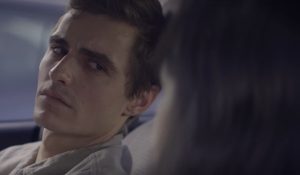
HtN: Cool! So, some of the other things I really admire about the film, beyond the script and the performances, are the cinematography and the editing. I particularly like those intense close-ups of Abbi in the car, from these oblique angles, and I also really like how you cut certain scenes, like the buying of the drugs, with those temporal shifts, flash-forwards and flashbacks…
M-LR: Thank you!
HtN: So, can you talk about your strategizing for both those aspects?
M-LR: Yeah! The cinematographer’s name is Polly Morgan, and she was the most obvious choice, from the beginning. It was the easiest thing, for me, because she just really understood what I was trying to do. I was afraid of anything that feels flat or bright. I was like, “I don’t want anything that looks like a movie.” You know? I wanted it to feel like we were there, a little more. And then, the roaming coverage stuff, of Abbi’s face, or even Dave, when he’s starting to come down, and there’s a lot of hands, and stuff: that was very much her idea. I mean, that was something that she really insisted on, because she was like, “You’re going to want to cut to this. I don’t know why.” Actually, she didn’t sound like that, but more like (with English accent), “You’re going to want to…”
SH: She’s English.
M-LR: “It’s all right. It’s OK. Right!” And then she calls people the wrong name.
SH: Confidently.
M-LR: She’s like (English accent), “Rebecca!” (normal voice) “No, it’s Sarah.” (English accent) “OK! Can you, um…” (laughs) Wonderful … She’s just so special to me, and it was a really beautiful working relationship, because I had never directed a movie before. So, I needed someone who could, like, give me the words when I don’t have them. And she was very patient, and very smart.
And then I had a similar process with editor Brian Scofield. (laughs) This always freaks Sam out. Whenever I have someone new in my life, I’m very scared that they’re not going to understand me. That’s always my fear. So I went (speaking very deliberately), “I want the sound to come before the words … but THEN … the picture is actually ahead of THAT!” And he was like…
SH: “Got it.”
M-LR: Yeah. And I was like, “Do you?” And I had to leave that day, and I’m driving to my next meeting, and I’m thinking, “There is no way that that man understood what I was saying. I mean, I barely understood it. It was just a feeling that I feel.” (laughs) And I came back, and that f***er did it. (laughs) So, it was pretty special. I had a couple of really special people working with me, who seemed to understand what I was trying to say through the limited number of words that I had.
HTN: Well, great job! I really enjoyed the film. Congrats!
ALL: Thank you!








